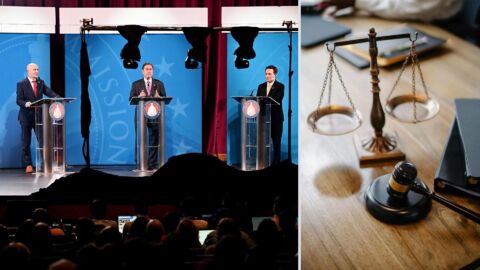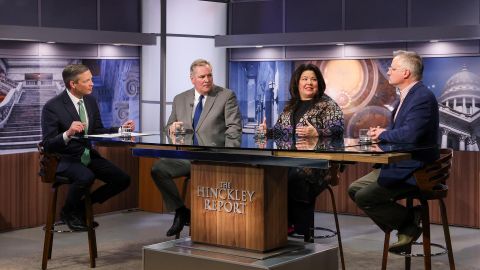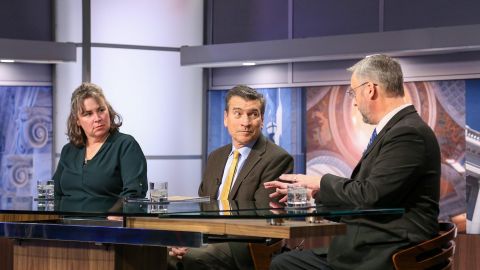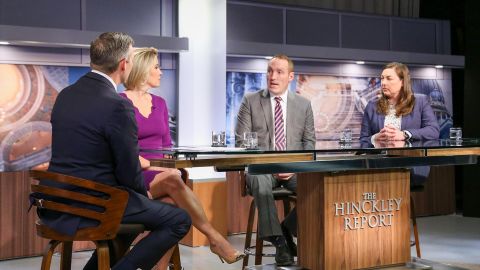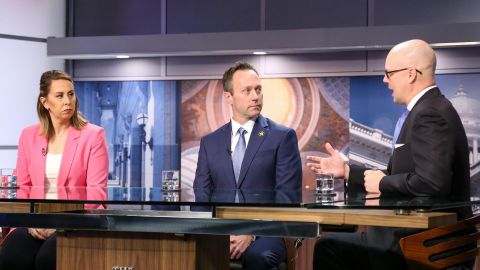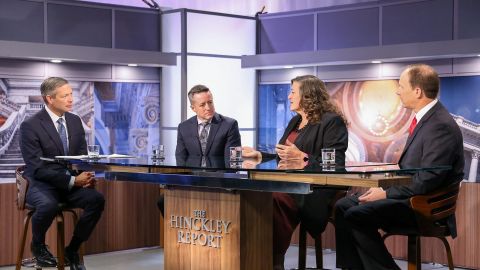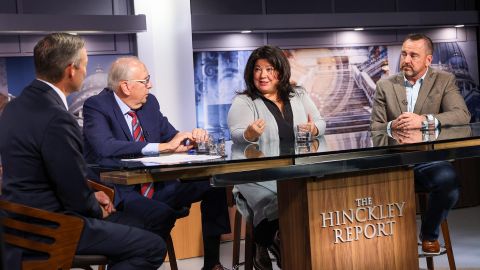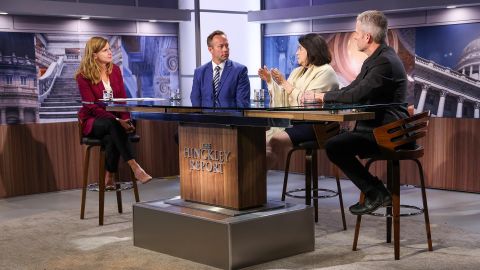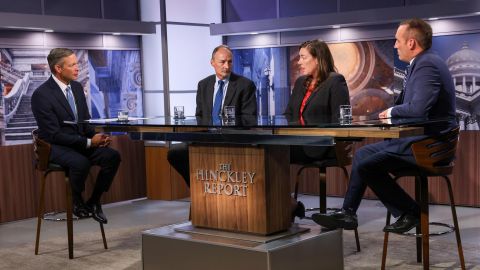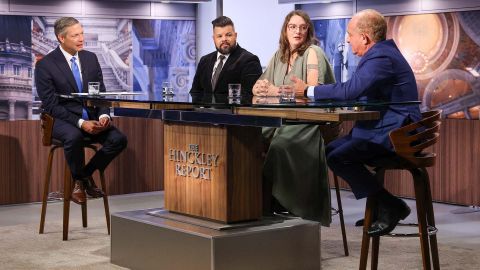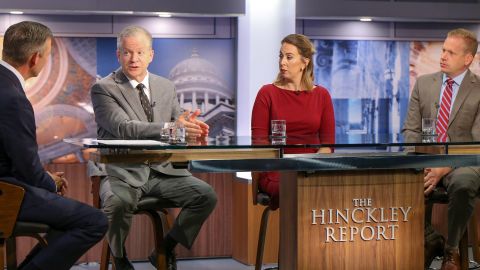announcer: Funding for "The Hinckley Report" is made possible in part by the Cleone Peterson Eccles Endowment Fund.
Jason Perry: Tonight on "The Hinckley Report."
Patrick McHenry: No person having received a majority, the whole number of votes cast by surname, a speaker has not been elected.
Jason Perry: Utahns weigh in on the contentious race for US Speaker as another government shutdown looms.
State leaders contemplate changing the office of the Attorney General.
And new polling reveals what voters think about hot button items.
♪♪♪ ♪♪♪ Jason Perry: Good evening, and welcome to "The Hinckley Report."
I'm Jason Perry, Director of the Hinckley Institute of Politics.
Covering the week we have Doug Wilks, executive editor of the Deseret News; Lindsay Aerts, reporter for KSL News Radio; and Daniel Woodruff, reporter for KUTV 2 News.
So glad you're with us this evening.
This has been such an interesting and sort of unprecedented week in politics, and we're gonna get into a couple of these key issues.
But Doug, I wanna start with you on one very close to home.
A big policy discussion is happening right now about the office of the Attorney General, specifically Representative Mike McKell is looking at a potential constitutional amendment to change how we get our attorney general.
Right now we vote.
That would be one where potentially the attorney general gets appointed.
Doug Wilks: Well, my question would be what's the problem you're trying to solve?
Right, the further you get away from the electorate, I would think that's not a good idea.
There are strengths for having a attorney general appointed, but the problem I think we're trying to solve is you want an engaged electorate, you want an electorate who understands who the office holders are, who the candidates are, so I would be hesitant to simply throw it out to try and solve a problem that you haven't yet identified.
Lindsay Aerts: And I think one of the problems that the legislature is trying to get at, to Doug's point, what problem are you trying to solve?
Is they're trying to get eyes on the office.
Is, you know, this has been an office that for, you know, several years has had multiple AGs with different corruption situations, although none were ever found guilty of that.
But the legislature at this point and the situation with Attorney General Sean Reyes and his close friend Tim Ballard and the questions that surround that I think is the straw that broke the camel's back, if you will, in terms of wanting to know how the office is being run.
Is it being run by Sean Reyes, or is it being run by the 500 other attorneys that are there and Sean Reyes is just a figurehead?
And they've talked about several ways to do that.
One of those is making it appointed versus elected, another way could be a possible legislative audit, right?
Some of these different scenarios in which-- or is it running a candidate against Sean Reyes?
So, lots of different scenarios, but I think what they're ultimately trying to get at his eyes on the office.
Jason Perry: Daniel, this is interesting because we have seen this in the past.
I think Senator Todd Weiler approached this once before, but it's back pretty much in earnest right now, at least from Representative McKell, who is an attorney as well.
You've been in these meetings, in fact, you've been in a meeting with the attorney general talking about this potential legislation.
Talk about what you heard.
Daniel Woodruff: Well, so Senator McKell, I think I want to point out too that he said his other concern is that he feels Sean Reyes has been absent from the office.
And so not only just about situations of who's corrupt or who's not, but Senator McKell said he believes that over the last couple of attorney generals we've seen a number of issues, and one of them he identified as absence.
As far as asking Sean Reyes about this, and I think we've got a quote to share from him, Sean Reyes's office doesn't like it.
Keep in mind he was appointed after John Swallow resigned.
So, this is a situation where our attorney general that we're talking about was appointed, although he's been re-elected a number of times.
But they basically said, I don't know, Jason, if you wanna pull up the quote, but he basically said it's not a good idea as far as representing the people.
Yeah, let's pull it up and have you talk about that one for just a second, Daniel, because it is interesting as we get ready for this, 43 states have an elected position here for the attorney general.
So, this would be a little bit of an outlier, but this is the response from Sean Reyes.
"Appointed AGs can't exercise independent discretion or decision making and they become just an extension of the governor or whomever appoints them."
So, clearly not a fan of this idea.
And in 2014, when this was brought up, I went back and looked at the vote, in order to pass this, because it would amend the constitution, you have to pass by a veto proof majority in both the Senate and the House.
That's two thirds.
You look at the vote in 2014, it got-- I think it was 16 to 13.
Point is, 16 votes is not enough, and therefore it did not advance the rest of the session.
Now, Senator McKell told me and probably told others that he feels that his colleagues are on board this time.
But I think a lot of lawmakers say that about their bills.
We'll see how that goes.
Doug Wilks: You have tools in place.
The audit is a good tool.
Investigations are a good tool.
The media investigates and has ability to do GRAMA and other things to get records.
So, there are things in place with an electorate, if the electorate is engaged, you can get at what you need to, to fight corruption.
Lindsay Aerts: And if my unscientific Twitter poll is any indication about how people feel about this-- it clearly is.
I think that less power for the people is something they're not a huge fan of, specifically because they, you know, feel like in a state with a super majority Republican legislature, executive branch, that this will consolidate power in a way, and that's one of the questions I posed of Mike McKell.
Well, okay, if you're going to appoint the AG, who's to say that the AG isn't just gonna do the bidding of the governor and the legislature because he aligns or she aligns with them politically?
And his response to that is obviously they'll be vetted by the senate, appointed by the governor and vetted, so lots of eyes on this person to make sure they can remain neutral and independent, but I think that's a concern of the people of Utah.
Jason Perry: Some are saying, and I want to show this clip from the governor in just a moment, but he's looking at this through the lens of kind of like what sometimes you do with judges, for example.
They're appointed by the governor, they're approved by the Senate, and then a retention election of some sort.
I think this is an important distinction right here to see if it gets any traction because, as Daniel mentioned a moment ago, Sean Reyes was appointed by Governor Herbert to fill the term of John Swallow.
But he, of course, run since then, but what does the governor have to say about this or to do with it ultimately?
Here's the clip.
Spencer Cox: The question I've always had, and this has nothing to do with our current attorney general.
I have a great relationship with Sean.
This is not in any way focused on him at all.
But when you run for office in the criminal justice system, there is a little bit of a perverse incentive there.
It's why we don't-- it's why we don't have judges run for office.
In lots of states judges have to get elected, just like governors and mayors and city council members.
But we decided that because you're dealing with criminal justice, you need to make sure that you're-- that there is no undue influence there.
And so, we have a governor that appoints judges, a senate who confirms those judges, and then the judges do stand for election.
It's a retention election, which is different.
You get to say-- the public gets to vote.
Do we want to keep that judge or do we want to get rid of that judge?
So, that's a way where the public still has a say.
We're not taking that away from them.
So, I'm-- that's an interesting model, but-- Jason Perry: So, does-- it looks like that wasn't a no that he's completely opposed to the idea.
Doug Wilks: Well, that's an interesting model he puts forward, right?
I can see the value of that.
You still have the same problem.
How do you engage the electorate?
How do you let them understand that these people are leading you when there's so much going on with getting your child to school, trying to buy a house, trying to afford rent, whatever you're trying to do?
But it's an interesting debate, and clearly it's not going away.
It's only heightened right now.
Lindsay Aerts: We also haven't totally had an engaged electorate with the AG's race specifically to this point.
I can't remember a contested AG's race in a long time where it was, like, this heated battle of who's going to be elected.
Usually these people run unopposed, our AGs run unopposed.
So, it's kind of one of those things, like, it's like, yeah, whoever runs for it, we're good with that.
And so, you do kind of need that, you know, the electorate again to really put the checks and balances on it.
But at the same time, if you appoint it, then there's checks and balances with this method that the governor is suggesting.
Daniel Woodruff: It's also interesting that the governor called it an interesting model.
A week ago he told me it was a better model.
So, he was supportive of it last week.
We'll see how it goes down the road.
But I think ultimately, at the bottom of this, Jason, is there are concerns about unanswered questions about Sean Reyes's relationship with Tim Ballard.
And that's what's really driving this right now.
There have been concerns about past attorney generals, but the reason we're talking about it today is that Sean Reyes, according to many in elected office, including in his own party, has not been as forthcoming about his relationship with the founder of Operation Underground Railroad and the practices that they employed on those anti-trafficking missions.
And a week and a half ago, we pushed Sean Reyes for answers, and his spokesperson really tried to shut it down.
They ended up releasing a statement the next day.
But even after that, Senator McKell said I have concerns that questions have not been answered.
And that's why we're seeing this debate playing out right now.
Jason Perry: We'll continue to watch this one as it goes forward, particularly if it gets into some legislation.
Doug, I wanna talk about what's happening in Washington D.C. that has impacts all over the world, even here in the state of Utah.
There is a serious battle going on for the Speaker of the House.
Talk about what's happening right there as of today.
Doug Wilks: Well, even today, they're doing another vote to see if they can seat Jim Jordan.
It was interesting, Kevin McCarthy introduced him today, put his nomination forward, but the big issue for me is the media is guilty of throwing around this word chaos.
Okay, I don't think it's chaos.
I think it's the process.
But you wanna gather it and make good decisions so that you can do the business of Congress.
And right now that's holding up funding, $105 billion that the president wants to put forward for Ukraine, Israel, and other causes.
Jason Perry: Explain that a little bit, because one might not realize that not having a speaker is going to impact whether or not any of those funds can flow.
Doug Wilks: Right, it speaks to the role of the speaker, what he puts-- brings forward, what they debate, what they vote on.
And right now, President Biden and other supporters want $60 billion for Ukraine, and the interesting thing there, that's to replenish our own reserves.
So, there's a domestic component to that.
He's putting forth $14 billion for Israel.
I think another $14 billion as it relates to border security.
So, those are big dollar amounts, but important dollar amounts to have America be the watchdog of the world, if you will.
Lindsay Aerts: I think the reason it feels a little bit like chaos is because of the way this started, right?
With this gang of eight that ousted Speaker Kevin McCarthy, and this fraction of the Republican Party continues to control the narrative in terms of who is not being elected as the Speaker of the House right now.
In my conversations with Representative John Curtis.
you know, it's interesting, I talked to him before the Jim Jordan name got put forward.
And so, you know, he was very much saying, "I don't like the fact that this eight gain control," but it's not just eight, it's eight plus whatever votes they need.
They have kind of this nebulous group of hard line conservatives in the House of Representatives who are able to kind of get the votes they need on whatever topic they need.
So, he kind of described it as this nebulous group, but we continue to see this faction not putting forward, like, supporting a Jim Jordan, and then the moderates now standing up and saying, "Okay, we don't want Jim Jordan as the speaker."
But I think it feels a little bit like chaos.
You heard Governor Cox yesterday call it an embarrassment to the country and the party.
I thought that was an interesting comment from him.
And as I talked to Representative Blake Moore and John Curtis, I think they're feeling the same way where it's just like, let's get this done.
And that's maybe why you see them support people like Jim Jordan, even though they maybe don't align with him politically.
They're like, we wanna get this over with, we need to continue the business of the House of Representatives, this aid, this funding, all of this.
The government's gonna shut down in a few weeks if they don't make decisions here.
So, I think they want this chaos to end.
Jason Perry: Okay, well, let's talk about that for a moment.
You mentioned Congressman Moore and, Daniel, he's been pretty vocal about this.
All four of our members of our congressional delegation voted for Jim Jordan, not because they necessarily love all of his politics, but because they want to get regular order back, particularly with a looming government shutdown.
Daniel Woodruff: That's right, and there are a lot of serious business items that are needing to be taken up.
It was interesting watching one of the recent videos that John Curtis put out on social media.
He called it second grade.
He said this is exactly what we would see with second graders in terms of what they've done so far and their inability to line up.
And he made an interesting point.
He said, "I bet we could go down the entire roster of Republicans and nobody would win."
And so, there was this push to empower the speaker pro tem, Patrick McHenry, to have him have expanded powers and be able to at least move some of this business forward.
For a while it looked like Jim Jordan was going to support that, and then did an about face and ended up not going that route.
Ultimately, whenever this ends, however this ends, it will be interesting to see.
But certainly, I think there is a lot of frustration, a lot among Republicans.
And I think also one quick note note in Politico, there was this editor that said this is really an illustration of the pre-Trump Republican Party and the post-Trump Republican Party trying to live together, and it's not working well.
Doug Wilks: You know, don't forget Kevin McCarthy struck a deal to keep government open, to keep service people paid, a very important compromise with Democrats, and then not a single Democrat voted to support him.
Now the Democrats can sit back, they can vote for Jeffries, but they can just wait there because it's politically expedient for them to do that rather than be politically expedient to get the money to run the country and to protect the world.
So, all of congress is playing a political game right now, and that's extremely difficult.
But I don't think it's chaos.
I think this is the process, and they have to embrace the process to find a solution.
Jason Perry: So, how do you get through this in your mind, Doug, because you essentially have maybe four Republicans that can really sway the entire vote.
This third vote looks like it's not going to happen for Jim Jordan.
You have a very small group that's able to influence the entire congress.
Doug Wilks: It took McCarthy, what, 15 votes to get over the line?
So, I suspect they'll do this a few more times, and at some point they'll get tired, and at some point they'll say, okay, we need to reach a resolution, and some will compromise.
Not everyone's just going to put a line in the sand.
I mean, it is a congress that wants to get to work.
Lindsay Aerts: Do we think it's going to be a name that has yet to be brought forward, or do we think it will be eventually the votes being there for a Jim Jordan?
Doug Wilks: I'm hoping for Jason Perry to be written in.
Daniel Woodruff: They don't have to be a member of the House.
Jason Perry: We'll start now.
Doug Wilks: We can put your name forward.
Jason Perry: Speaking of names that are coming forward, can we talk about our Senate race for just a moment?
This has been an interesting week, Daniel.
We're starting to see the disclosures, the financial disclosures.
We have some candidates that are-- have raised a lot of money, and they've also been able to donate a lot of their own resources to their campaigns.
Daniel Woodruff: Correct, you see news releases saying Brad Wilson has raised X amount of money, but you look at the fine print, and he's given himself quite a bit of money while raising quite a bit of money as well.
You have the Roosevelt Mayor Rod Bird, who's given himself a pretty sizable loan, Jason, I think it was $1 million dollars.
Jason Perry: That's right, $1 million dollars.
Daniel Woodruff: And Trent Staggs gave himself tens of thousands as well.
I think with some of these candidates, Bird may be a good example, his name ID isn't very high, so he's got to have money to be able to get it out there and probably doesn't have the wherewithal to raise that at the moment, so he gives himself some self-funds.
Brad Wilson certainly has raised a lot of money, but needs to probably bolster himself and maybe discourage other Republicans who might be looking at the race saying, "If he's got that much money and I can't get that much money, maybe I don't want to get in."
Go ahead, Lindsay.
Lindsay Aerts: I was just going to say, I agree with that.
I think for Brad Wilson it's to freeze the field type of effect where you come out with, okay, I maybe raised $412,000 individually, loaned myself $600,000, but I've raised $1 million dollars.
I have $1 million dollars on hand or $2 million.
Yeah, I have $2 million on hand, and so now other people who can't self-fund themselves are saying, "I can't raise $2 million.
I definitely can't."
So, money sort of talks in the campaigning world, I would say, of politics, where it shows support, it shows you have backing, it discourages other people from getting in.
It's still early in the senate race, so I'm really curious right now who else might get in the race to challenge a Brad Wilson and Trent Staggs and, and the mayor of Roosevelt at this point?
If we'll see any other big names.
Daniel Woodruff: I thought there would be a name by today, another name.
Lindsay Aerts: Yeah, I haven't really heard any, and I don't know who it might be at this point unless it's Jason Perry.
Jason Perry: So, I have another opportunity.
Thank you so much.
Doug Wilks: Maybe we should extend the show to an hour to go through a few campaign promises that you may have.
Lindsay Aerts: I think Brad Wilson is trying to show strength.
Jason Perry: So, he is for sure.
And in fact, to that point, Doug, he got a pretty interesting endorsement this week, kind of a strong one from the governor.
Doug Wilks: Right, the governor supports him, and I think it's not just money that's having influence.
I think there are-- I mean, he's been the leader of the house for quite a while.
He has a lot of political friends.
There's a lot of people who think he'll do a very good job.
There's a lot of people-- he'd be good for Utah.
So, there's both-- there's a political calculation, a money calculation, but there's also, well, who will do the best job?
And I think Republicans do line up behind him, many strong Republicans.
And obviously the governor has the top seat in the state, so that was a big deal today, or this week.
Jason Perry: I wanna talk about what's happening with our presidential election a little bit, because, like it seems to happen all the time, yeah, the Utah connection to some of these things.
So Lindsay, I wanna talk about Senator Romney.
He is-- he started to weigh in even more heavily about how he thinks Republicans need to narrow that field.
He, of course, he's talking about he doesn't want it to be President Trump, and for it not to be, we-- they need to consolidate around a candidate.
Lindsay Aerts: Yeah, and I don't really know how you do that.
I think his his solution is stop funding people, right?
Just, like, kind of freeze them out money-wise and just allow-- coalesce around somebody, right?
He's kind of made that call to big donors.
But yeah, certainly at this point where there's-- I don't even know the number right now.
How many Republicans are in the field?
It doesn't feel like while Trump has a clear front runner status in terms of polling, there's still a lot of polarization around him.
Still, a lot of can we do another four years of President Trump?
He's facing all the legal battles that he's facing, and those are coming to a head, and will come to a head, especially around Super Tuesday.
So, he could have some convictions, he could have, you know, continued charges he's facing.
So, I do think there needs to be a coalescing, but how that happens, I'm just not totally sure I have the solution.
Jason Perry: Well, how about one that we'd read, which is interesting.
Daniel, did Oprah Winfrey really say that Mitt Romney should be president and she would be his vice president?
Daniel Woodruff: I haven't read the full book that McKay Coppins wrote on Romney, but apparently she did.
And Mike Lee tweeted, "So does that mean Oprah is a Republican?"
It's-- but she wanted that unity ticket.
Jason, I think it's interesting too to see the pundits that keep watching world events and wondering if that will change the field at all.
So this week someone, I can't remember who, was saying this is the time for Nikki Haley and Mike Pence to shine with Israel and Gaza and all of that, you know, their world experience.
And other times it's been other issues and-- or Trump's legal battles.
Will any of this shake up the field in any meaningful way?
I do think, again, we're still a couple of months out, it's early, but at this point none of those Republican candidates has been able to vault themselves to the point where they probably want to be.
But there are still a few months ahead.
Doug Wilks: There is-- there's a couple of things happening.
One, Paul Ryan was here in Utah several times the past ten days, and he's an anybody but Trump person and wants anyone to win but Donald Trump.
You have the No Labels group, and if it's Trump versus Biden, the No Labels group will put forward a ticket, and there will be a third party ticket.
We spoke with them at the Deseret News specifically about that, and they've lobbied for people to do that.
But they're waiting to see what happens.
So, after Super Tuesday, Mitt Romney wants the Republicans to coalesce around a candidate separate from Trump.
We've talked to some presidential candidates, and no one's really ready to go down that path yet.
So, I really think we get to February, March, and then it's really going to see what's happening.
Jason Perry: Well, do make such an interesting point, Lindsay, with people you are interviewing too about whether or not given how polarized the candidates are in terms of their support there really is an opportunity here for a No Labels or an independent candidate to take it to go forward.
Lindsay Aerts: Yeah, and I think the majority of Americans, and maybe that's just my personal opinion.
I'm not sure I'm supposed to share, but maybe polling vets this out.
But I just think Americans are craving for a middle of the road type of, like, I support some on this side, I support some on that side.
But our current political system doesn't allow for that.
You have to either be all in Republican or all in Democrat, and, you know, obviously people have their ideals, and that's important.
But politically it doesn't-- our system doesn't really allow for someone to run middle of the road, right?
It doesn't allow for someone to say I'm socially liberal, but I'm fiscally conservative.
It feels like it's all or nothing on either side, you have to be all socially liberal and all fiscally liberal or the other way around.
And so, I think it really will be interesting to see if America, if the nation really supports a third party candidate, maybe this is the time where that sticks.
Jason Perry: Interesting.
I want to get one more aspect of the potential candidates coming forward with a poll that the Hinckley Institute did with you, Doug, with the Deseret News, because we wanted to see what was happening with sort of our aging elected officials here.
And so, we asked the question whether or not you-- it's just the Utahns, whether or not there should be a maximum age for elected officials, meaning that under-- they have to be under a certain age to be permitted to hold office.
We have a lot of senior folks in Congress in particular, and this become a conversation.
Interestingly enough, 64% of Utahns, Doug, said they think there should be an age limit on running for office, and that age, 70, 70 years old.
Doug Wilks: Yeah, that makes me a little uncomfortable the older I get, but-- Jason Perry: But you could still run, turns out.
Doug Wilks: I mean, again, it's such a one note today, but the electorate is in charge.
You can put people in congress who can do the job.
We've seen examples of people who maybe have stayed too long.
You know, we lost Dianne Feinstein.
I'm originally from California, I've followed her.
My mother was in her sorority, so that was such an amazing career, and it was tough to see that last year with her.
But Mitt Romney, others in their 70s are certainly effective, certainly working hard.
I hate to put an age limit on that.
Lindsay Aerts: Seventy is the new fifty.
Let's be honest.
Doug Wilks: Maybe 80, if you had to put a number on it.
I was surprised it was so low, if that's low.
Daniel Woodruff: Yeah, I think 70, wow.
You know, I know a lot of 70 year olds and they seem kind of young to me.
Doug Wilks: And they're working, they're still in the workforce.
Daniel Woodruff: They're still busy, they're still busy, they're still going.
I've also seen 80 and 90 year olds still going and very sharp.
It's very interesting to put a number on it, because I think at the end of the day when we discuss this, it's because there are certain people of certain ages that are raising questions about their mental ability or competence or whatnot.
There are others that are not.
And so, you know, cutting it off, I think you're gonna cut off some, yeah, that might be problematic, but others that could still go on to serve.
It would certainly disqualify Mitt Romney or others that we've seen in the state and Orrin Hatch that was there for quite a while.
Jason Perry: So, Lindsay, some of these elected officials, including Mitt Romney, actually stated one of their considerations was age.
Lindsay Aerts: Yeah, and I think the question is, how do you not necessarily remove someone, but what happens when that person becomes unable to do the job or appear mentally unfit or mentally-- or, you know, not able to kind of continue the work.
How does that process happen?
I think that's what we're trying to get at with the age question.
And so, one of the solutions is just put a cap on it, just put an age limit, right?
But, like Daniel was saying, there are plenty of 80 and 90 year olds still working and still effective.
However, there are some 70 year olds who maybe need to hang it up, and so-- Doug Wilks: And there's great wisdom, I mean, if you have people who had a fantastic career and they're 65 or 70 and they can give a 6 year term or 2 terms to congress, you want that wisdom there.
So, it's very difficult to say no, anyone after this age we don't want them.
Jason Perry: And some is--are definitely arguing, so there is a way to do this and it's through the ballot box.
Doug Wilks: Yeah, we just have to get engaged.
We have to get off the couch and-- Lindsay Aerts: And I don't disagree with your notion at all.
All power to the voters, but we haven't seen that happen, we haven't seen-- Doug Wilks: I'm optimistic.
Lindsay Aerts: I know, and it's great, but we haven't seen some of these long standing older people being removed.
When, you know, Senator Mitch McConnell, when the health really becomes an issue.
Doug Wilks: Well, there's power too, right?
I mean, Orrin Hatch was there for a long time, so Utah has an outsized influence when you have someone there for a long time.
So, the electorate might not even be wanting to give up that power.
Jason Perry: That might be true.
Thank you so much for these great insights this evening on some very critical issues.
And thank you for watching "The Hinckley Report."
This show is also available as a podcast on PBSUtah.org/HinckleyReport or wherever you get your podcasts.
Thank you for being with us.
We'll see you next week.
♪♪♪





